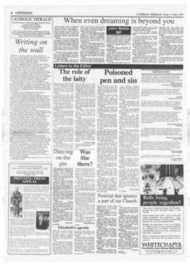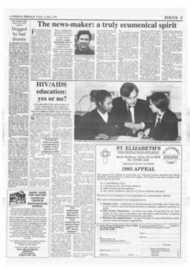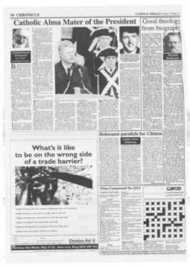Page 1, 14th May 1993
Page 1

Report an error
Noticed an error on this page?If you've noticed an error in this article please click here to report it.
Tags
Share
Related articles
Rc Schools On The Right Way Forward
Go-ahead For Joint School
Church Heads Off Threat Over Appointments
Church-inspired Attack On Baker
Bill Details 'disappoint' School Chiefs
Catholic and Anglican leaders optimistic of winning concessions from Department for Education
Bid to secure Church schools
by Murray White
CATHOLIC and Church of England leaders were set to win crucial changes to the Government's Education Bill this week, ensuring that the status of the Churches as key providers of schooling would be preserved into the next century.
Top level negotiations between the Department for Education and officials representing Catholic and Anglican schools have centred on the need to acknowledge the "oversight" and "responsibility" of the Catholic and Anglican bishops and education agencies. The Catholic Education Service has also pushed for full representation on funding bodies and the curriculum council.
Sources involved in the negotiations have hinted that the key role of representative Church bodies may be enshrined in law for the first time. The specific mention of the Catholic bishops has never occurred in prior legislation.
But there was continuing concern that Education ministers had refused to promise safeguards over bus passes for pupils at Church schools in the future. Leading Catholic peer, the Duke of Norfolk, repeatedly pressed the Government over fears that hundreds of schoolchildren would face bills of up to £300 a year.
In a letter to Government minister Baroness Blatch at the weekend, the Duke said that decisions in home-to-school transport by local councils should ensure parental preference.
During the committee stage for the bill, which was completed yesterday, he had berated the Government for reneging on its promise in the landmark 1944 Education Act to pay for the running of schools that the Churches had built. "Our schools were built on the express agreement that transport would be provided," he said.
The Duke said the best solution was a measure to ensure that Education Secretary John Patten had the duty to intervene when councils "unilaterally and unreasonably" withdrew bus passes. He warned that most councils were awaiting a clear legal statement from Westminster they could act.
The transport dilemma remains one of the only thorns for the Church sector, which is now confident that the key statutory basis for the provision of Catholic education will be "preserved and enhanced" by the bill the lengthiest education measure ever introduced.
The Deputy Director of the Catholic Education Service, Michael Power, who has overseen Catholic negotiations, was optimistic that talks were near a breakthrough. He told the Catholic Herald: "The Government are making all the right sort of noises and we are hopeful they will bring forward amendments at the report stage of the bill."
Mr Power said that the Church was "indebted" to the efforts of the Duke and Lord Northborne, who had "vigorously pursued the amendments, often late at night, and, on two occasions, after 2 am".
Anglican concerns over the bill were voiced in the House of Lords by the Bishop of Guildford, Michael Adie. He attacked plans to make grants to Church schools discretionary, saying that the measure would "put a financial noose around our necks".
Under current laws Mr Patten's requirement to fund voluntary aided schools is compulsory. But Bishop Adie warned that to allow the Secretary of State to vary the scale of grants would increase uncertainty and multiply the problems of planning.
"This could be used to put pressure on school governors to make decisions that they believe are not in the interests of the children in their schools," he warned, adding that schools may have to consider opting out to ensure future levels of funding.
blog comments powered by Disqus











